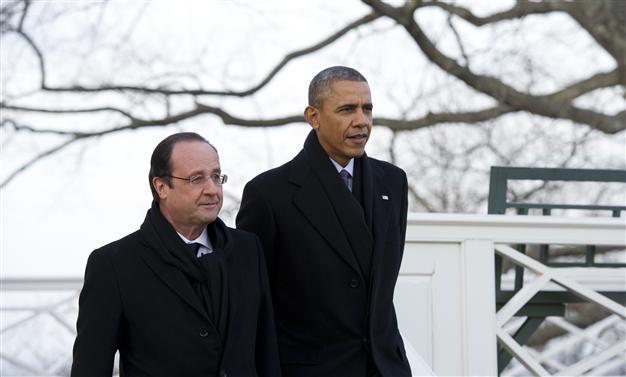Obama, Hollande tour Jefferson's Monticello estate
CHARLOTTESVILLE, Virginia – The Associated Press

French President Francois Hollande (L) and US President Barack Obama (R) visit Monticello, the residence of Thomas Jefferson, third president of the United States of America, on February 10, 2014, in Charlottesville, as part of a three-day visit to the US. AFP Photo
President Barack Obama and French President Francois Hollande celebrated the long-standing ties between their nations by touring the sweeping Virginia estate owned by Thomas Jefferson, the former American president and famed Francophile.Obama's rare out-of-town trip with a foreign leader Monday opened two days of events marking Hollande's state visit to the United States.
Standing together in Monticello's grand foyer, Obama said the elegant home represents "the incredible bond and the incredible gifts that France gave us."
For Hollande, the trip to Washington was a chance to get an ocean away from his romantic troubles. The French president is traveling in the U.S. without a female companion, following his very public split with longtime partner Valerie Trierweiler.
Their breakup has dominated headlines following a gossip magazine's revelations about a secret tryst with a French actress. The last-minute change of plans created a tricky situation for American officials planning a high-profile event where diplomatic protocol and etiquette are in the spotlight.
Still, Hollande was receiving a warm welcome reserved only for America's closest allies.
The trip to Monticello was aimed at highlighting the countries' deep ties. Jefferson was an early U.S. envoy to France and is honored with a statue on Paris' Seine River. Monday marked the first time a sitting president has visited Monticello with a current foreign head of state.
Following the tour, Obama said of Jefferson: "He was a Francophile through and through."
Hollande praised Jefferson's unique role in U.S. and French history and said of the two countries, "We will remain friends forever."
Obama also acknowledged that the house and its slave quarters represent "the complicated history of the United States."
"It's a reminder for both of us that we are going to continue to fight on behalf of the rights of all peoples, something I know France has always been committed to, and we are committed to as well," Obama said.
Hollande is visiting Obama at a time of particularly strong relations between their nations. Their talks are expected to focus on areas where U.S.-French priorities are visibly in sync, such as in efforts to resolve nuclear concerns in Iran, a civil war in Syria and extremism in Africa. The leaders also will seek to highlight mutual interests such as combating climate change and securing a trade deal between the U.S. and Europe.
"A decade ago, few would have imagined our two countries working so closely together in so many ways. But in recent years our alliance has transformed," Obama and Hollande wrote in a joint op-ed in The Washington Post and France's Le Monde. "We are sovereign and independent nations that make our decisions based on our respective national interests. Yet we have been able to take our alliance to a new level because our interests and values are so closely aligned."
The French opposed the U.S.-led war in Iraq.
Hollande's state visit continues into Tuesday, when he'll be greeted at the White House with trumpet fanfares and a 21-gun salute. Following his meetings with Obama, the leaders will hold a joint news conference, then don tuxedos for a state dinner honoring Hollande.
















